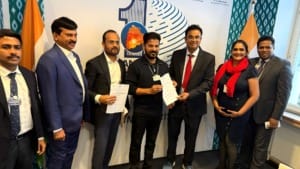Singapore Polytechnic partners ESGpedia to strengthen sustainability efforts for local businesses
Singapore Polytechnic and ESGpedia partner to help Singapore businesses cut emissions, boost energy efficiency, and support the Green Plan 2030.

Singapore Polytechnic (SP) has partnered with ESGpedia, a leading environmental, social and governance (ESG) data and technology company in Asia, to help local businesses improve their sustainability practices. The collaboration combines SP’s expertise in training and consultancy with ESGpedia’s digital platform, enabling companies to strengthen carbon accounting and boost energy efficiency.
Table Of Content
The initiative supports Singapore’s wider push to decarbonise the economy. It also ties into the Energy Efficiency Grant (EEG), which helps firms co-fund investments in energy-efficient equipment of up to S$350,000. SP has been approved by the Building and Construction Authority (BCA) and the National Environment Agency (NEA) as a third-party assessor for the scheme.
Combining training and digital tools
The programme has two main elements. ESGpedia provides standards-aligned carbon accounting and sustainability reporting tools, allowing businesses to accurately track greenhouse gas emissions. SP complements this by offering sustainability learning programmes, consultancy projects and energy efficiency assessments under the EEG, helping companies identify and adopt measures to cut emissions.
Lam Kok Seng, Centre Director at SP’s Centre for Environmental Sustainability & Energy Efficiency, said the collaboration allows the polytechnic to expand its ecosystem while building staff expertise. “This opportunity also allows SP to expand its ecosystem and leverage the business network for sustainability initiatives, including joint industry engagements to enable knowledge sharing and the opportunity for SP’s students to work on real-world sustainability projects,” he said.
Benjamin Soh, Founder and Managing Director at ESGpedia, added that energy efficiency remains central to both environmental and economic progress. “We are delighted to be partnering with Singapore Polytechnic to help businesses like LBD Engineering establish and track their greenhouse gas emissions, embark on standards-aligned sustainability reporting, and tap on energy efficiency services through the Energy Efficiency Grant (EEG) to decarbonise their value chains,” he said.
Early results from industry adoption
One of the first companies to benefit from the programme is LBD Engineering, a major builder with diverse construction capabilities. The firm has used ESGpedia’s platform to measure its Scope 1, 2 and 3 emissions and to produce a sustainability report aligned with the Global Reporting Initiative (GRI). It has also worked with SP to assess the eligibility of Infinity Cube’s Battery Energy Storage System (BESS) under the EEG, supporting sustainable construction and improved operational efficiency.
LBD Engineering’s Chief Executive Officer, Lim Boon Huat, said the partnership has had both environmental and financial benefits. “Beyond corporate responsibility, LBD Engineering believes that improving our sustainability posture leads to better business growth. We have hence worked with ESGpedia, to utilise their digital platform to calculate our carbon emissions and generate our Sustainability Report in accordance with the Global Reporting Initiative (GRI). We are pleased to be able to take active steps to improve our energy efficiency through Singapore Polytechnic and the Energy Efficiency Grant, to achieve further cost-savings and build stakeholders’ trust,” he said.
Infinity Cube, the technology provider behind the BESS solution, sees its systems as critical to reducing the construction sector’s reliance on diesel generators. Chief Executive Officer Oh Jun Rong said, “By replacing or hybridising diesel generator use, our systems directly reduce emissions, improve fuel efficiency, and enhance power reliability. We are committed to working with institutes of higher learning such as Singapore Polytechnic to advance technical education, support pilot deployments, and equip local businesses with both knowledge and solutions to meet future carbon neutrality goals.”
Supporting Singapore’s Green Plan
The collaboration between SP and ESGpedia is aligned with the Singapore Green Plan 2030, which seeks to cut national emissions and drive sustainable economic growth. By combining digital solutions, training and access to funding, the initiative aims to help more businesses adopt sustainable practices and remain competitive in a market where demand for greener projects is increasing.
With the government set to apply environmental criteria to project tenders, the partnership provides firms with the tools and expertise needed to meet these requirements. ESGpedia and SP plan to continue working together to support local companies as they pursue carbon neutrality and build resilience in a low-carbon economy.
















